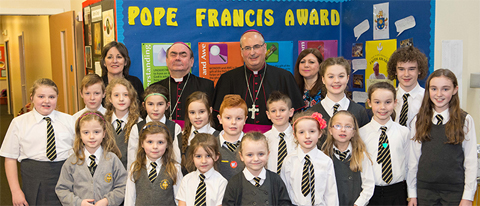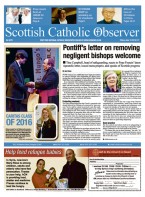May 20 | ![]() 0 COMMENTS
0 COMMENTS ![]() print
print

Please protect, develop our education
A message of thanks and advice from MICHAEL McGRATH, the retiring director of the Scottish Catholic Education Service
In May 2003 I was introduced to the media as the first director of a new support service for Scotland’s Catholic schools being set up by the Catholic Church. It was strange to read reports of being dubbed the new ‘Czar’ or ‘Supremo’ of Catholic schools, as if I was being asked to run an empire or a corporation. The reality was somewhat less grandiose than these titles suggested.
Now, as I anticipate retiring in August 2016, my mind is drawn to thoughts of what has been achieved in 13 years and what kind of platform has been established on which a new SCES director can build in the years ahead. While it’s for others to comment on any successes or otherwise, I believe that a number of significant developments have affected Scotland’s Catholic schools in these years. None of these has emerged from the work of any single person. Each has been the product of close collaboration among teachers, head teachers, parents and others who have generously contributed their time, their expertise and their enthusiasm to ensure that our work was focused on improving outcomes for children and young people.
Just as Curriculum for Excellence was emerging we developed a national syllabus for Religious Education for pupils from P1 to S6, one that has received the rare accolade of official endorsement from the Vatican and has attracted plaudits from Catholic school systems around the world. Much to the surprise of some, perhaps, we also developed extensive programmes of relationships, parenthood and sexual health education for both primary and secondary stages. These complement our religious education programmes in offering a vision of life which is inspired by God’s love for all people and by God’s call to relationship.
In February 2016 we launched advice on how Catholic schools should incorporate into their processes of evaluation and planning a clear focus on school mission, identity, values and ethos. This will lead to schools addressing particular themes—such as ‘serving the common good’ or ‘promoting Gospel values’—when teachers, students and parents discuss how their Catholic school is Developing in Faith.
In April 2016 we published Companions on the Journey, setting out a national strategy for promoting career-long professional learning (CLPL) for teachers in Catholic schools. The aim is to offer more accessible opportunities for teachers who wish to develop the knowledge and skills which will benefit their work in accompanying young people as they journey through key life stages, providing ‘witness’ through their own lives of integrity, as Pope Francis has encouraged them to do. Some teachers may engage with aspects of theology which are directly relevant to programmes of Religious Education. Others will explore moral and ethical issues which affect young people in a world which is beset by moral and ethical challenges. I anticipate that it will be a major priority for my successor to ensure that teachers are encouraged and supported to engage in such on-going professional learning.
One of the most significant initiatives of recent years has been the introduction of the Caritas Award, established following the UK visit of Pope Benedict XVI, and the Faith Award, named in honour of Pope Francis. Provided for pupils in secondary schools and primary schools respectively, both awards encourage young people to demonstrate how religious faith can have a positive impact on people—in their school, their local community and in the developing world. The outcomes have included wonderful testimonies from young people about their commitment to show love to their neighbours, far and wide, and to commit their talents to serving the needs of others. These acts of service, carried out by young people of all faiths and none, are inspired by the Gospel and bear great hope for a world often characterised by self-interest and greed.
Of course I also recognise that Catholic education continues to face serious challenges in the years ahead. The national teacher recruitment crisis has particular implications for Catholic schools across the country. We are working with partners to encourage young people to aspire to become teachers and school leaders. Teacher shortages haven’t reached the catastrophic levels of the mid 1970s when I entered the profession. But, without concerted efforts to boost the profile of teaching as a rewarding and vital career, we could end up back there.
I am sanguine, but not complacent, about the likely continuation of attacks on Catholic schools from the ‘usual suspects.’ While remaining silent about all the evidence showing that Catholic school communities are successful, inclusive and effective, these critics loudly proclaim their intolerance of parents who freely opt for Catholic education (where that choice is available to them).
I am happy to compliment the secularist lobby for being well-organised and media-savvy. I just wish that they would display a more mature and respectful demeanour which might lend itself to reasonable dialogue, rather than insult and hyperbole.
I have enormously enjoyed the last 41 years working as a teacher, above all working with and for young people. I loved being a head teacher, which, despite all the challenges which come with the job description, is still the best job in the world. I am fortunate to have met many former pupils who have grown into fine men and women, some teachers and many parents. I am grateful to many colleagues across the country who have worked with me and offered me support and encouragement, particularly in this most recent post as SCES director. I wish everyone involved in Catholic education great success. In Scotland I sense that we are at a significant point when the tectonic plates of educational policy and governance structures may be starting to shift. I doubt if this will lead to the appointment of any more ‘czars’ or ‘supremos.’ I hope that it will produce teachers who are passionate about working with young people, helping to transform their lives through learning.
In the Catholic Church, in Scotland and beyond, I can see signs a renewed commitment to formation in Faith, with young people—and those of us not so young—keen to develop their understanding of the Catholic tradition and to be authentic in their practice. For that, I thank God and pray for blessings on all who minister in the Church.











